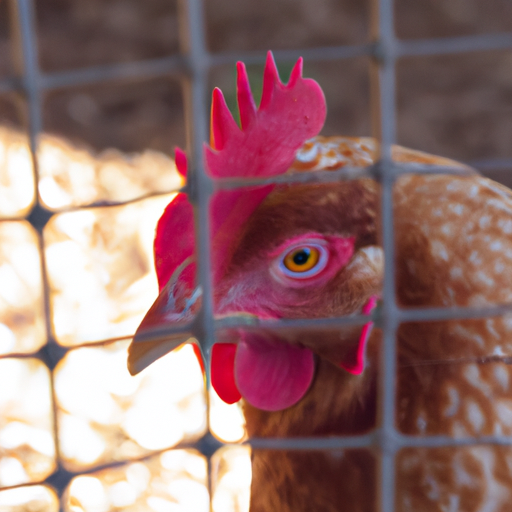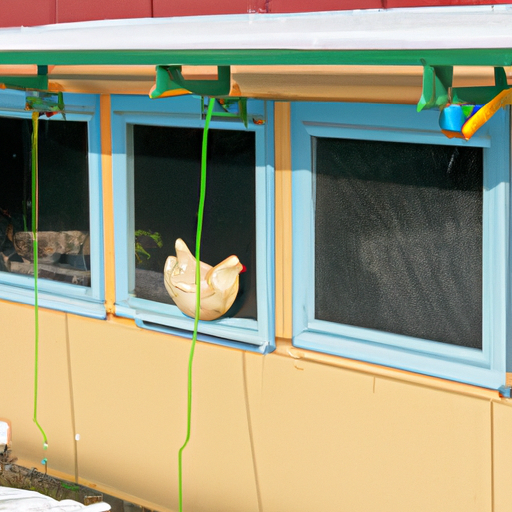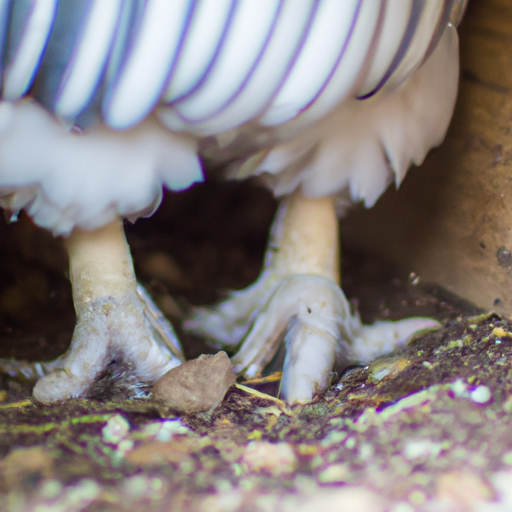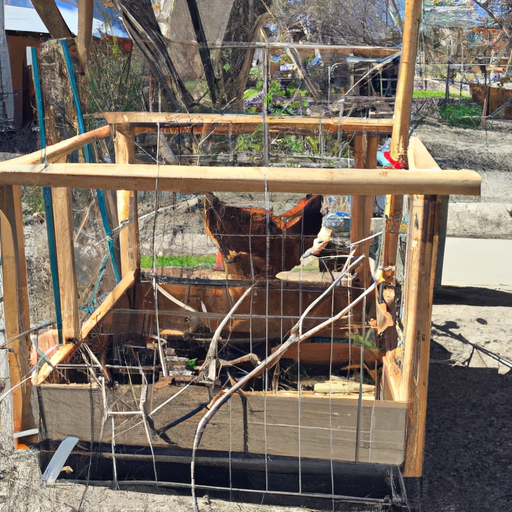Living in an urban environment may pose challenges when it comes to ensuring the privacy and security of your beloved flock of urban chickens. From curious neighbors to potential predators, finding the right measures to protect your feathery friends can be a daunting task. However, with a few simple tips and tricks, you can create a safe and secure haven for your urban chickens, ensuring their privacy and well-being while keeping your worries at bay.
Choosing a Secure Location for Your Urban Chickens
Consider Your Property Layout and Accessibility
When choosing a location for your urban chickens, it is important to consider the layout of your property and its accessibility. Ideally, you want to select an area that is easily accessible for you to reach and maintain your chickens. Consider the proximity to your house, water source, and other necessary amenities. Additionally, think about the layout of your property and how it can accommodate the needs of your chickens, such as providing enough space for them to roam and forage.
Evaluate Potential Risks and Threats
Before setting up your chicken coop, it is crucial to evaluate potential risks and threats that may compromise the safety of your urban chickens. Identify any potential predators in your area, such as raccoons, foxes, or stray cats, and plan accordingly. Additionally, assess any environmental risks, such as flooding or extreme weather conditions, and take preventive measures to address them.
Install Proper Fencing and Enclosures
To ensure the security of your urban chickens, installing proper fencing and enclosures is of utmost importance. Use sturdy materials that will withstand predators’ attempts to break in. The fencing should be buried at least a foot underground to deter burrowing animals. Additionally, consider installing a roof or netting to protect your chickens from aerial predators. Regularly inspect the fencing for any signs of wear or damage and promptly repair any issues to maintain a secure environment.
Implementing Privacy Measures for Your Urban Chickens
Use Visual Barriers to Shield Your Chickens
Maintaining privacy for your chickens not only ensures their well-being but also minimizes potential stress. Use visual barriers, such as tall plants or a trellis, to shield your coop from prying eyes. This will create a more peaceful and secure environment for your chickens, reducing the likelihood of them getting startled or agitated by external stimuli.
Create a Designated Privacy Zone
Designate a specific area within your property as a privacy zone for your chickens. This can be a secluded corner or a section that is not easily visible from the street or neighboring properties. Establishing this privacy zone will give your chickens a sense of security and seclusion, making them feel more comfortable and at ease.
Install Curtains or Blinds in the Coop
If you want to provide an extra layer of privacy for your urban chickens, consider installing curtains or blinds in their coop. This will not only limit the visibility from the outside but also provide your chickens with a cozy and secluded space. Make sure to choose materials that are easy to clean and maintain, as hygiene is crucial for the health of your chickens.
Ensuring Physical Security for Your Urban Chickens
Secure the Coop with Sturdy Locks
To prevent unauthorized access to your chicken coop, it is vital to secure it with sturdy locks. Invest in high-quality padlocks or latches that are designed to withstand tampering. Regularly check the locks for any signs of wear or damage and replace them promptly if needed. By ensuring the physical security of the coop, you can minimize the risk of theft or intrusion.
Install Surveillance Cameras or Alarms
For an added layer of security, consider installing surveillance cameras or alarms near your chicken coop. This will help deter potential intruders and provide you with valuable evidence in case of any incidents. Opt for cameras with night vision capabilities and ensure they are properly positioned to capture all possible angles. Additionally, consider installing audible alarms that will alert you and potentially scare off intruders.
Utilize Motion-Sensor Lights
Motion-sensor lights can be an effective deterrent for nighttime predators or intruders. Install these lights around the perimeter of your chicken coop to illuminate the area whenever motion is detected. This will not only startle potential threats but also alert you to any suspicious activity. Remember to regularly check and replace the bulbs to ensure continuous functionality.
Protecting Your Chickens from Predators
Identify Common Urban Predators
Being aware of the common predators in your urban area is essential for protecting your chickens. Conduct research or consult with local authorities to identify the specific predators that may pose a threat to your flock. This knowledge will help you understand their habits, behaviors, and preferred entry points, allowing you to better tailor your predator deterrent strategies.
Implement Predator Deterrents
To protect your urban chickens from predators, implement deterrents that make it difficult for them to access your coop. Use hardware cloth or heavy-gauge wire mesh to reinforce the coop’s windows and ventilation openings. Ensure there are no gaps or loose ends that predators can exploit. Place obstacles, such as gravel or chicken wire, around the base of the coop to discourage digging. Additionally, consider using predator deterrent sprays or electronic devices that emit distress calls to discourage predators from approaching.
Consider Using Guard Animals
Introducing a guard animal, such as a well-trained dog or a vigilant goose, can help protect your urban chickens from predators. Guard animals have a natural instinct to protect their flock and can act as early warning systems, alerting you to any potential threats. However, it is important to select a breed that is compatible with chickens and properly train and socialize the guard animal to prevent any harm to your flock.
Preventing Disease and Health Risks
Establish a Regular Cleaning Routine
Maintaining a clean and sanitary environment is crucial for preventing disease and health risks in your urban chickens. Establish a regular cleaning routine that includes removing waste, freshening bedding, and disinfecting the coop and surrounding areas. Regularly inspect your chickens for any signs of illness, such as lethargy or abnormal behavior, and consult a veterinarian if needed.
Practice Proper Biosecurity Measures
Implementing proper biosecurity measures is essential to prevent the spread of diseases among your urban chickens. This includes limiting the exposure of your flock to external sources of infection, such as wild birds or contaminated equipment. Disinfect footwear and wash hands thoroughly before and after interacting with your chickens. Avoid introducing new birds without proper quarantine procedures and regularly monitor your flock for any signs of illness.
Provide Adequate Ventilation and Sunlight
Proper ventilation and access to sunlight are vital for the overall health and well-being of your urban chickens. Ensure that the coop has sufficient ventilation to prevent the build-up of harmful gases and excessive moisture. This can be achieved by installing vents or windows in the coop. Additionally, allow your chickens access to natural sunlight, either by providing windows or creating an outdoor space where they can safely roam and bask in the sun’s rays.
Ensuring Safety during Free-Range Time
Supervise Free-Range Time
When allowing your urban chickens to free-range, it is important to supervise them to ensure their safety. Predators may be more likely to attack when the chickens are out in the open. Keep an eye on your flock and be prepared to intervene if any threats are detected. Avoid leaving your chickens unattended for extended periods and be mindful of potential hazards, such as traffic or toxic plants.
Create Barriers or Boundaries
To further protect your free-ranging chickens, consider creating barriers or boundaries within your property. This can be achieved by installing fences, chicken runs, or utilizing natural obstacles like hedges or plants. These barriers help establish clear boundaries for your chickens and minimize the risk of them wandering into dangerous areas or neighboring properties.
Train Chickens to Return to Coop
Training your chickens to return to their coop on command can be beneficial in ensuring their safety during free-range time. Use positive reinforcement and treats to associate a specific sound or command with returning to the coop. Regular training sessions can help reinforce this behavior and make it easier for you to gather your flock when needed.
Educating Your Neighborhood about Urban Chickens
Inform Neighbors about Proper Chicken Care
Take the initiative to educate your neighbors about proper chicken care to ensure a harmonious coexistence. Share information about the benefits of urban chickens and dispel any misconceptions or concerns they may have. Provide them with guidelines on how to interact with your chickens safely, including not feeding them anything harmful and refraining from entering your property without permission.
Address Concerns or Misconceptions
Many people may have concerns or misconceptions about keeping urban chickens. Take the time to address these concerns and provide accurate information to alleviate any fears. Explain the steps you have taken to ensure the privacy, security, and cleanliness of your chickens. By openly addressing concerns, you can foster understanding and cooperation within your neighborhood.
Promote Responsible Chicken Ownership
Encourage responsible chicken ownership within your neighborhood by setting a positive example. Maintain a clean and odor-free coop, keep noise levels at a minimum, and ensure your chickens do not become a nuisance to your neighbors. By demonstrating responsible ownership, you can help dispel any negative stereotypes associated with urban chickens and promote a positive image of urban farming.
Understanding Legal Requirements and Regulations
Check Local Zoning Laws
Before starting your urban chicken venture, it is essential to check the local zoning laws and regulations in your area. Different municipalities may have different rules regarding chicken ownership, such as the number of chickens allowed or specific coop requirements. Familiarize yourself with these regulations to ensure you are in compliance and avoid any legal issues.
Obtain Necessary Permits or Licenses
In some areas, obtaining permits or licenses for keeping urban chickens may be required by local authorities. Research the specific requirements in your jurisdiction and ensure you obtain any necessary permits or licenses before getting chickens. Failure to comply with these regulations may result in penalties or fines.
Comply with Noise and Odor Regulations
Urban chickens can generate noise and odor, which may cause disturbances to your neighbors. Be aware of any noise or odor regulations in your area and take appropriate measures to minimize any potential disruptions. Regular coop cleaning, proper waste management, and keeping your flock in a well-insulated coop can help mitigate noise and odor issues.
Creating a Disaster Preparedness Plan
Develop an Evacuation Strategy
When disaster strikes, having a well-thought-out evacuation strategy is crucial to ensure the safety of your urban chickens. Identify potential evacuation routes and safe locations where you can relocate your chickens temporarily. Prepare adequate transportation containers or carriers to transport your chickens safely. Familiarize yourself with local emergency services and resources that can assist you in case of a disaster.
Prepare Emergency Supplies and First Aid
Stocking up on emergency supplies and first aid kits is essential for ensuring the well-being of your urban chickens during a disaster. Keep a supply of non-perishable food, clean water, and any necessary medications on hand. Additionally, have a first aid kit specifically designed for chickens that includes items like wound disinfectant, bandages, and heat packs.
Establish Communication Channels
Establishing communication channels with fellow urban chicken owners or local authorities can be invaluable during a disaster. Join local chicken groups or forums to stay informed about any potential threats or warnings. Establish contact with local animal control or emergency services to ensure they are aware of your urban chickens and any special assistance they may require.
Building a Supportive Community for Urban Chicken Owners
Join Local Chicken Groups or Forums
Building a supportive network of fellow urban chicken owners can provide valuable knowledge, resources, and emotional support. Join local chicken groups or forums to connect with like-minded individuals who share a passion for urban farming. These communities can be a source of advice, tips, and camaraderie, enhancing your experience as an urban chicken owner.
Participate in Urban Farming Events
Engaging in urban farming events or workshops can not only expand your knowledge but also help you connect with other urban chicken enthusiasts. Attend local farmer’s markets, community garden events, or urban farming conferences to learn from experienced professionals and share your experiences with others. These events provide a platform to network, exchange ideas, and stay up-to-date with the latest practices in urban chicken keeping.
Share Knowledge and Resources
Contributing to the urban chicken community by sharing your knowledge and resources can foster a supportive and collaborative environment. Offer assistance to new chicken owners, provide recommendations for reliable suppliers, or share your experience with specific challenges you have faced. By actively participating and contributing, you can help strengthen the community and promote the success of urban chicken owners as a whole.




